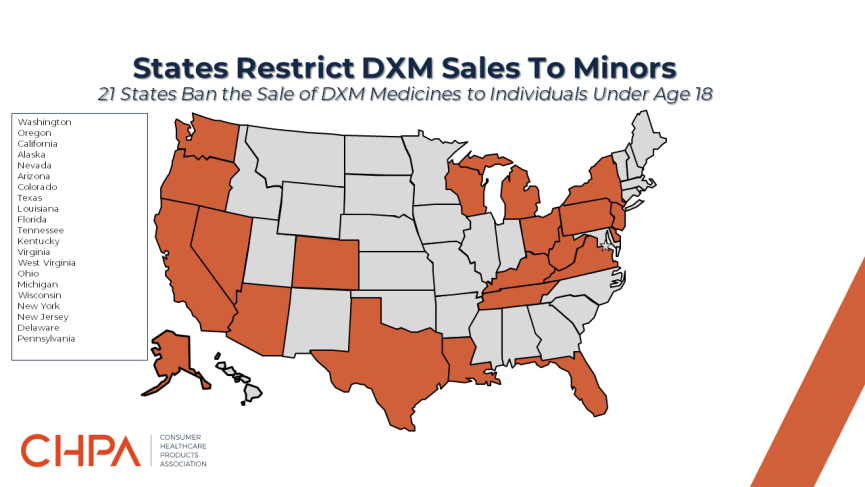Preventing Dextromethorphan Abuse
CHPA supports legislation that would prohibit the sale of over-the-counter (OTC) cough medicines containing dextromethorphan to teens under the age of 18.
Dextromethorphan (DXM) is a safe and effective ingredient found in more than 100 over-the-counter (OTC) cough and cold medicines. First approved by the U.S. Food and Drug Administration (FDA) in the 1950s, it is a non-narcotic cough suppressant that works by raising the coughing threshold in the brain. It has no pain-relieving properties and is not addictive.
While millions of Americans use DXM safely each year to relieve cough symptoms due to the common cold or flu, data released in December 2016 by the National Institute on Drug Abuse (NIDA) annual Monitoring the Future survey shows that approximately three percent of teens admit to abusing OTC cough medicines containing DXM to get high.
To address this issue, CHPA collaborates with established and trusted leaders specializing in substance abuse prevention and community mobilization as well as makers of OTC cough and cold medicines containing DXM.
Comprehensive Efforts to Curb DXM Abuse
The leading makers of OTC cough medicines have also engaged in educational efforts to curb abuse for a number of years. Our efforts include:
Educate
Educating and engaging parents and community members via the Stop Medicine Abuse campaign. In 2009, CHPA launched StopMedicineAbuse.org after manufacturers voluntarily placed an icon the packaging of DXM-containing cough medicines, pointing parents to the website. The Stop Medicine Abuse campaign aims to educate parents and spur them to action – to educate themselves, to talk with their children, to safeguard their medicines, and to spread the word to other parents. Today, StopMedicineAbuse.org is a hub of prevention-related information and a host of free resources.
One of the campaign’s features is the Stop Medicine Abuse Blog, which leverages parent, community member, and stakeholder voices where authors discuss preventing teen medicine abuse and other risky behaviors. The campaign is also active on Facebook, Twitter, and YouTube.
Inform
Informing and supporting retailers in states that have enacted laws preventing minors from purchasing medicines containing DXM. The retailer initiative includes a Pharmacists & Retailers page on StopMedicineAbuse.org that features a suite of “Check Before Checkout” content to support retail employees’ understanding of the sales law and provide guidance around the actions they need to take before selling these products. Additionally, the page provides informational handouts retailers can give to consumers purchasing these medicines.
Outreach
Directly reaching teens looking to abuse with provocative content that intercepts their searches to abuse cough medicine. In May 2012, CHPA joined forces with The Partnership for Drug-Free Kids to launch a digital and social media-based prevention initiative targeting those teens actively searching online for information on how to abuse DXM or chatting about abuse. We reach teen “likely triers” where they hang out online with dissuasive, peer-to-peer messaging and imagery. Our goal is to increase teen perception of risk and social disapproval, two proven ways to reduce abuse. We’ve validated the approach through extensive research and are monitoring and measuring impact.
Elements of the teen campaign include:
- WhatisDXM.com
- DXM Labworks mobile app
- YouTube videos
- Public service announcements
Collaborate
Collaborating with established and trusted leaders that specialize in substance abuse prevention and community mobilization and have access to parents, educators, healthcare providers, and community leaders.
- The Partnership for Drug-Free Kids: CHPA and the Partnership for Drug-Free Kids began joint work in 2003 to ensure that adults with influence and oversight over young people are aware that teens may be considering abusing DXM. CHPA currently works with the Partnership on a DXM teen initiative targeting those teens actively searching online for information on how to abuse DXM.
- Community Anti-Drug Coalitions of America: CHPA and the Community Anti-Drug Coalitions of America (CADCA), which represents over 5,000 community coalitions nationwide, have partnered to help coalition and prevention leaders mobilize their communities and educate key stakeholders about the dangers of OTC cough medicine abuse. Additionally, CHPA and CADCA support the designation of October as National Medicine Abuse Awareness Month. As part of these efforts, CHPA supports CADCA’s Dose of Prevention Challenge, an initiative designed to encourage coalitions to take action around combating medicine abuse.
- National Association of School Nurses: CHPA and the National Association of School Nurses created Home to Homeroom, an educational program that teams up parents with the medical expert in their teen’s school — the school nurse — to help prevent and address teen medicine abuse.
- Others: Additionally, CHPA reaches out to a variety of organizations, including parent groups, education associations, health professional societies, law enforcement, the retail community, pharmacists, and others to raise awareness on the issue.
Federal and State Congressional Activity
CHPA supports federal and state legislation to ban the sale of OTC cough medicines containing DXM to minors (those under the age of 18) and to ban the sale of raw, unfinished DXM to ensure only entities registered with the FDA — such as scientists, researchers, and manufacturers — have access to this form of the ingredient. A nationwide ban on sales of cough medicine to minors would lead to a greater decrease in the abuse rate of these medicines by teens, while also maintaining access for the millions of legitimate consumers of these products each year. To complement our educational efforts, we continue to advocate for both federal and state legislation.



